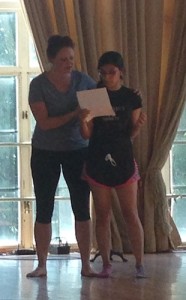After the third week of rehearsals, Caroline Crocker (DSF’s Gertrude) shared a few thoughts about where she is in the process of creating her role.
June 30, 2014

As I write this, we have just completed the third week of rehearsals for Hamlet. Everyone’s process for working on a play is a little different, but I think it’s fair to say the first two weeks were largely about figuring out what we were doing. Common questions, voiced or unvoiced, were: “What does this thing I’m saying really mean?” “Where do I move?” “When do I do this thing?” Or even, “What the heck is going on here?”
Not that there won’t continue to be questions, but for the most part we’ve figured out the basic structure of what we’re doing, the lines are solid in our brains, and we can move from, “What am I doing here?” to actually doing it. In rehearsal, we talk a lot about the actions that each character is taking in pursuit of a goal, as well as what might be in our way of achieving that aim. We’ve been working to make that happen since day one, but now is the time when we get to be fully on the court, fighting full-throttle to reign in a son, protect a throne, or avenge a father. At its best, it’s exciting and a little scary.
On a personal level, I have made some significant discoveries with Gertrude this week. When we started this process, I was concerned mostly with creating a loving relationship with Hamlet. While it was clear to me that there was dysfunction in the relationship, I still wanted to play a mostly concerned, caring mother who went about it in a flawed way. In the beginning, I wasn’t willing to be too openly affectionate with Claudius or too dismissive of Hamlet’s grief.
Once we did some real work on the latter part of the play, however, I realized that that was where Gertrude got a chance to let her son in and listen to him, as well as to truly feel the guilt of her second marriage. If I played a Gertrude who was trying to listen to her son from the beginning, and who felt openly a little guilty about her relationship with Claudius, it wouldn’t be nearly as dramatic or interesting as if that came about from the action of the play. This seems obvious now, and it is when I analyze the play intellectually, but I had to go through the process of rehearsal to be willing to let myself go there. Hamlet says, “I must be cruel, only to be kind.” I had to rehearse Gertrude’s vulnerable side before I was able to let her somewhat crueler self show.
OTHER REHEARSAL UPDATES
Michael Gamache’s Second Week of Rehearsal
Clare Mahoney’s First Week of Rehearsal




